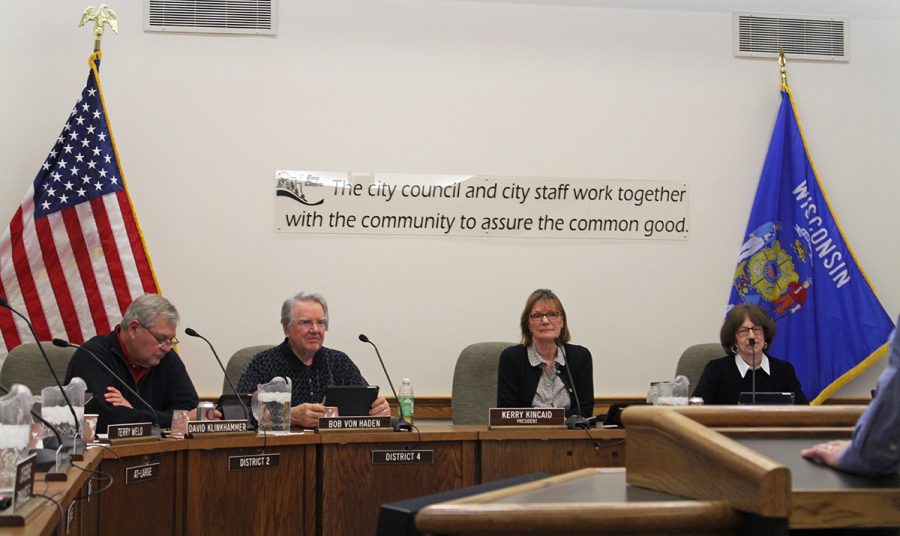Public Good Order ordinance proposal addresses public disturbance, intoxication
Students leaders upset they were excluded from proposal discussion
Photo by Kar Wei Cheng
The discussion will continue from noon to 1 p.m. on Thursday at the Chancellor’s Roundtable in the Dakota Ballroom of the Davies Student Center.
Proposed updates to an ordinance introduced to the Eau Claire City Council on Tuesday will change how police officers issue citations for problems associated with alcohol, drug use and public disturbance.
Commonly referred to as the “Public Good Order ordinance,” the adjustments would serve the purpose of limiting cases of public disruption caused by excessive drinking and drug use. They come as a response to concerns presented by residents and UW-Eau Claire administration, Jenessa Stromberger said in a memorandum.
Stromberger, the assistant city attorney, drafted and introduced the amendments to the public good order ordinance, which was originally created in 1953.
According to a press release from the UW-Eau Claire Student Senate, the ordinance specifically effects the Randall Park Neighborhood that stretches from First Avenue to Tenth Avenue and from the Chippewa River to Fulton Street.
There are four key differences to the proposed Public Good Order ordinance.
The first change centers around policing public disturbance. Changes to the ordinance include policy revisions that would allow officers to give citations to loiterers, individuals refusing to leave a business and individuals speaking at a volume that disrupts a resident inside his or her home.
Second, the ordinance updates will address physical neighborhood disruption. The proposed amendment would limit the amount of time interior furniture can sit on lawns, driveways or rooftops to under 24 hours. Additionally, there would be new regulations about proper disposal of trash left in lawns, like empty bottles or cans.
The revisions would focus on public intoxication, too. An individual under heavy drug or alcohol influence would be prohibited from public space, which includes bars or taverns. Currently, Stromberger said, there are no restrictions on public intoxication in Eau Claire.
Finally, the ordinance alterations would place restrictions motor vehicles for hire. Between 10 p.m. and 3 a.m., buses, cabs and cars would not be able to stop in residentially zoned areas unless desired by the occupant of a residence. However, three labeled stops on Water Street will exist.
Such transportation would not be permitted to drop off more than 10 people at a time, according to an article published on Feb. 23 by the Leader-Telegram.
Further, the Leader-Telegram article said being charged with a public behavior violation could amount to $295 in net fines, with court costs included.
The proposal has received mixed feedback, notably from student leaders at Eau Claire and a local business owner.
Scott Small, the Student Senate intergovernmental affairs director, said the proposed changes have considerable effect on students who live off campus. Therefore, student voices should have been valued during the proposal-making process.
“We as a Student Senate feel as though we should have had a seat at the table,” Small said.
During the update process, the Randall Park Neighborhood Association, the City of Eau Claire, Eau Claire Police Department, Eau Claire City-County Health Department and UW-Eau Claire administration worked together to decide the direction of the changes.
Small said the proposed changes restricting vehicles for hire overlook student well-being.
“The number one thing that (Student Senate) is worried about is student safety,” Small said.
Companies like Right Way Shuttle Incorporated, whose blue buses offer students late-night rides between 8:30 p.m. and 2:30 a.m. on Fridays and Saturdays, will also be affected by this portion of the legislation.
“I would prefer that the motor bus section is left out of the ordinance,” said Right Way’s Director of Operations Tom Klatt.
In addition, students have voiced opposition against the elimination of the late-night ride service. Hannah Haraldson, a junior nursing student, said the proposal has the potential to do more harm than good.
“I think this would take away a safe ride for students, causing other problems like drunk driving or walking in unsafe environments,” Haraldson said.
Moving forward, Small said Student Senate will submit amendments to the legislation to the City Council, which will then have to be approved by the council body.
From noon to 1 p.m. today in the Dakota Ballroom of the Davies Student Center, the Chancellor’s Roundtable will address the Public Good Order ordinance. City officials will be available to answer questions. The event will also be livestreamed on the Student Senate Facebook page.

Neupert is a fourth-year journalism student at UW-Eau Claire. She is the executive producer of Engage Eau Claire on Blugold Radio Sunday. In her spare time, Neupert's working on becoming a crossword puzzle expert.











